#guin sard lineford
Explore tagged Tumblr posts
Text

recent piece for the sun and moon edition zine de nuit
71 notes
·
View notes
Text
Oh god I’ve hit Characters with my analysis beam again
(Aka, my thoughts on Turn A’s “the world isn’t quite ready for me to begin an Industrial Revolution in a skirt” scene, by way of analyzing Lily Borjarno and Guin Sard Rhineford*)
*Yes I understand that Lineford is technically the canon transliteration, I just find Rhineford to be a more evocative name
So! This is the interaction in question



Seems simple enough; Guin wants to be a titan of progress, thinks violating the social norms around clothing would get in the way of that, and Lily tells him “fuck social norms, I, a woman, will lead as I am,” right?
Well. Mostly.
The thing is, Guin’s missing half of the conversation. Lord Guin Sard Rhineford is the ruler of the region of Inglessia, and seems to have inherited both that title and a strong industrial base from his father, or perhaps his grandfather. How the family obtained such rulership is left to the imagination, but, given their apparent closeness with the Heim family, their industrial strength, and Guin’s habit of personally tinkering with and repairing his car (a hobby unfit for a well-bred gentleman, given the dirtiness involved in it), it seems likely to me that they are new money. Guin himself is incredibly ambitious, with a stated motivation of wanting to become president of Ameria, which at this point seems to be several disparate regions, each presided over by their local nobility. He has a keen mind, and changes his plans on several occasions so that events will shake out with him having more power than before (confounding the negotiations with the Moonrace in the 2 years before they land so that he can gain more by negotiating in person, claiming ownership of the Willgem, the Earthers’ only spacecraft, striking an alliance with Gym Ghingham in order to obtain technological blueprints from the Moon, and a military force with which to conquer the Earth), and is rather straightforward, only using the slightest bit of deception in his tactics, for things like getting Loran and the Turn A on the Willgem as he ditches Kihel, Dianna, Lily, Sochie, and assorted others. That straightforwardness is half of what makes the above conversation more complex than the surface reading would indicate.
Enter Lily Borjarno. Daughter of Lord Borjarno, and heir to the region of Luzianna (well, as far as I can tell. The wiki insists that she is the youngest of 13, but I also recall the show suggesting that she’s heir apparent, so perhaps she’s his favorite as well), Lily initially seems to be an effusive young woman, who is good-natured, although maybe a bit petty. And that’s not necessarily incorrect; that rather does seem to be her own personality more than a mask she wears! However, that impression belies the keen mind underneath, one easily capable of subtle political maneuvering, and also noticing (and double checking) that the Zacktraegar seemed to have some semblance of gravity. Lily is very clever, and easy enough to dismiss as a silly and spoiled noblewoman, which gives her the potential to be delightfully dangerous. Take, for instance, one of her earlier interactions with “Kihel” (Dianna in disguise); in what seems to be a fit of whimsy, perhaps prettily driven by “Kihel”’s apparent closeness with Guin, Lily pushes “Kihel” into working as a nurse in one of Luzianna’s field hospitals. This seemed to be a little bit mean-spirited when I first watch it, but looking back, it’s more clearly Lily testing “Kihel,” finding out where this potential-ally’s limits, moral sense, and work ethic all lie. “Kihel” passes the test with flying colors, and the two (three, technically) seem to be friends from there on out. The point is, Lily was subtle. This matches with the way the Borjarno family seems to be old money, in contrast with the Rhinefords; their mobile suits are named after the family, the Duke is thank god I double checked, I was combining two entirely separate characters in my head. That would’ve been embarrassing. Erizona has a Duke, not Luzianna, and the military dress uniform I was about to go on a tangent about belongs to some other guy.
Cough. Anyways. The way Lord Borjarno interacts with his people compared to the way Guin interacts with his suggests to me that the Borjarno family are well-bred and can be considered old money, which matches with the land they have too. Luzianna has plentiful fertile farmland, while Inglessia contains much rockier soil, and likely would’ve struggled to find economic importance as anything beyond the ports within until the Rhinefords’ industrial power came to be. As old money, the Borjarnos would be more used to the subtleties of noble politics, and Lily truly grasps subtlety well. This is the other half of that conversation’s complexity.
Let’s take a look at it again, shall we?



Here, Lily starts by asking a question in a rather sideways manner. While the words are about a skirt, she’s really asking Guin “if you love Loran as much as you claim to, why are you trying to force him to conform to your wants in a partner?” Guin’s answer reveals three things.
1. He values gathering power (in this case, being the sole leader of industrial development) over his other desires, something which is entirely consistent with his characterization thus far
2. He places Loran’s wants and needs in a relationship below his own (something which Lily likely already gleaned from his continuing to call Loran “Laura,” despite that persona having been retired at this point, but which she probably appreciated confirmation of)
3. Guin missed the metaphor entirely. Guin’s response is almost entirely a non-sequitur when taken as a response to Lily’s real question, and of course it would be! Guin, while capable of deception, is a rather straightforward man, of course he misses Lily’s subtly hidden question!
And knowing this, Lily decides to drive home a point that Guin will also miss. “I’ll govern Ameria in a skirt!” She says, and while this is a proclamation of how she plans to break the status quo and take a position of great power as a woman in the equivalent of the 1920s, it’s also a declaration that she won’t abandon the things she loves at the altar of political gain. She won’t leave behind her skirts, her hats, her parasols, or her friends, and will instead bring them forward with her, because she well and truly loved them.
And Guin misses that point.
And Guin ends Turn A Gundam with none of his resources, influence, or allies, save for an odd girl whom he doesn’t particularly like, while Lily ends Turn A Gundam with the influence they both had at its beginning, and new friends, allies, and technology besides.
#this i say#turn a gundam#Lily Borjarno#Guin sard lineford#Guin sard Rhineford#sorry if this is shit I got thinking about how Lily was talking about Love and Guin just. missed it#and then I had to write an essay about it#at like 3 am#again. thank GOD I fact checked some of this shit#I would’ve been SO embarrassed to post this talking about how “Duke Borjarno is a proper Duke not just a Lord’’ when he is just a Lord
11 notes
·
View notes
Text
IBO reference notes on . . . queerness
How has it taken me this long to write about this aspect of the show? (He asked rhetorically, staring at the enormous amount of fanfic that basically stands as a thesis statement on how very queer this part of the Gundam franchise is [as opposed to all the other terribly straight parts, he added, sarcastically].)
Anyway, let's do it. Full spoilers up to the end of the show will follow, together with discussion of child abuse and exploitation, since that is what IBO is all about.
Special thanks to @lilenui and @prezaki for their invaluable assistance in locating sources.
Statement of caveats: this work is an amateur analysis of the English-language localisations (subtitled and dubbed) of a piece of Japanese media. I do not speak or read Japanese. I am myself bi, which qualifies me to be attracted to more of the cast than the average viewer, and have a working knowledge of LGBTQ+ history in the UK and USA, which tells me nothing about the cultural and historical context in which this anime was made. As such, I will not be addressing the behind-the-scenes production or the corporate mandates surrounding it but will focus narrowly on what I perceive to be present in the text (hereafter meaning both the script and animation, and any additional fictional details provided elsewhere).
Queerness in Gundam
Some background before we dive in. To my knowledge, the first character in the Gundam franchise to be intentionally depicted as LGBTQ+ is Guin Sard Lineford from Turn A Gundam (1999). An ambitious young aristocrat who spends the series on the line between hero and villain, he is infatuated with protagonist Loran Cehack and the show makes little attempt to play this as anything other than one man falling in love with another.
This is entirely one-sided and not appreciated on Loran's part, although that seems to have less to do with it being homosexual attraction than with Guin's high-handed and entitled attitude to life, filtered through heavily gendered social norms. For plot reasons, Loran spends several episodes cross-dressing as 'Laura Rolla', corsets and all, and Guin continues referring to him as 'Laura' long after the deception is no longer required, saying it 'suits him better'. Guin is eventually called out on this by a third character, who accuses him of forcing an idea of feminity on the other man rather than stoop to place himself in the position of a 'wife'. Objectifying Loran is presented as of a piece with Guin's overall flaws as a person, to whit, putting his own views about how things should be above the material reality and desires of those around him.
Guin is also the only explicitly gay character in the show (I'm honestly not sure how to classify whatever Dianna Soreil and Kihel Heim have going on, but it's certainly not labelled in the text). Therefore no counterpoint is provided to demonstrate healthy queer relationships. I don't state this to dismiss his inclusion: he forms part of a smart, nuanced plot thread, and Gundam creator Yoshiyuki Tomino had to fight to get Guin's homosexuality clearly included. But even so, Guin is a palpable step forward rather than a watershed moment, and the end result veers close to some nasty stereotypes about queer people imposing their desires on others.
There are other examples of characters transgressing gender norms in Turn A, most especially Loran's aforementioned cross-dressing. He is comfortable playing the part of 'Laura', in ways that mitigate viewing this situation as the extended joke it might be in another production. Funny moments do come up – particularly in the lead-in to his 'debut' as he acclimatises to the female attire of the show's pseudo-Edwardian setting and takes posture lesson – but he and the concept of a man in ladies' clothes are never made a subject of mockery. The same cannot be said for the character of Sochie Heim, whose attempts as a young woman to fulfil a gung-ho masculine role often turn comedic. This is part and parcel of her assaying militaristic modes of action, which are soundly mocked across the board. It nevertheless stands out next to Loran/Laura.
Further, Loran's status as a literal moon-child carries implications for his attitudes. His dismissal of existing social standards on Earth is very much presented as correct, and in keeping with what I know of Tomino's other writing and stated beliefs, but it dovetails unfortunately with a treatment of queerness as otherworldly, not something that may be found among an average population. We get another example of cross-dressing in the next-but-one series, Gundam 00 (2007, not a work Tomino helmed), where the usually male-presenting artificial lifeform Tieria Erde switches to a female presentation (in a ball-gown, no less) during a covert mission. This sufficiently parallels Loran's case, I assume it was a deliberate call-back, being as it is a disguise enacted by someone even less typical than a boy from the moon.
What I am driving at is that while Guin, Loran and Tieria may be characters who are queer or perform queerness in some manner, they do not necessarily represent an outright embracing of queerness as a mundane facet of everyday life.
Fast-forward to 2024 and the latest mainline Gundam show is a lesbian romance.
If you have been following my blog for a while, you will know I do not hold The Witch From Mercury in especially high regard. I think it is annoyingly messy, frequently half-baked, and, broadly-speaking, exactly as frustrating as I'd expect from the guy who wrote Code:Geass. It's still an explicit love story that opens with a clangingly blunt statement about the acceptance same-sex relationships and ends with the two female leads happily married to one other. For all its flaws, I genuinely think the central relationship between Suletta Mercury and Miorine Rembran is a nice piece of story-telling, not to mention admirably open about what it is doing. Like it or lump it, Gundam is gay now, properly, with a protagonist and co-protagonist who can be definitively labelled queer and whose romance appears entirely unremarkable for the setting (in terms of being same-sex; clearly there is a lot to remark upon otherwise).
I would be remiss if I did not mention that the conclusion of the series was accompanied by a certain amount of corporate arse-showing, with hollow attempts to walk back the ending seemingly for the sake of appeasing homophobic elements within and without the companies that produce Gundam. The frankly laughable nature of these actions stands testament to how unequivocal G-Witch is. It is flatly impossible in my opinion to interpret as anything other than flagrantly homosexual, and that's great.
Between this interesting but limited start and the full-throated present lies Iron-Blooded Orphans (2015), my absolute favourite and the show that got me writing slash fic after years of… not doing that. So: what is the deal with queerness in IBO?
Natural for a human
By my count, including all present spin-offs, there are three characters stated in-text as being attracted to people of the same gender (Yamagi Gilmerton, Iznario Fareed, Deira Nadira), two who are at the least open to the idea (Norba Shino, Mina Zalmfort), two whose mutual attraction is stated within the context of polyamory with a third person of the opposite gender (Atra Mixta, Kudelia Aina Bernstein), one whose sexuality is briefly hinted at (Chad Chaden), and one male character who is possibly not attracted to women (Orga Itsuka).
Let's get Iznario out of the way first, because the less time we spend on the actual paedophile, the better.
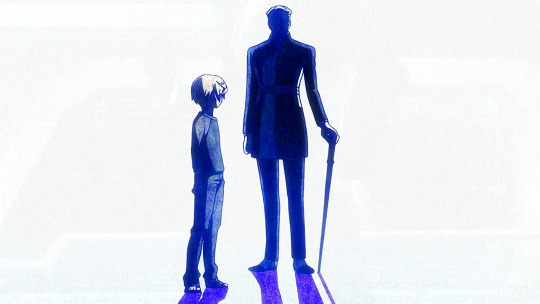
Lord Iznario Fareed is a rich, powerful aristocrat who sexually abuses young blonde boys and inadvertently sets large parts of the plot in motion as part of quasi-villain McGillis' backstory. In a lesser show, Iznario would be the embodiment of the 'predatory queer' stereotype Guin skirts the edge of. Here, however, he is very much not the only 'gay' character present and his proclivities demonstrate one of the many ways the world exploits vulnerable children, a core theme of the series. Early on, we see fleeting glimpses of young girls being pimped out on the streets of Mars. Iznario shows this social failing extends to the much richer Earth and although he is portrayed as the worst among the Gjallarhorn elite, they all abuse their power for personal gain. Thus, as much as the reveal of what he has done carries a certain shock value, it is not present purely for cheap impact. (This isn't the essay to discuss it, but the flashbacks to McGillis being abused as a child are a masterclass in how to frame such things around the victim, clearly communicating what's happening while avoiding gross voyeurism.)
I don't know how deliberate it is the canonical gay character who is shown in an entirely positive light fits the profile of Iznario's victims to a T, but it does underscore we're looking at a case of power allowing people to get away with hideous things, not a stand-in for queerness in general. To an extent I resent having to spell this out, since it seems so obvious Iznario is not fulfilling the role of a homophobic cliché. Sadly, the cliché exists and the point is worth discussion.
Moving swiftly on: Yamagi and Shino.
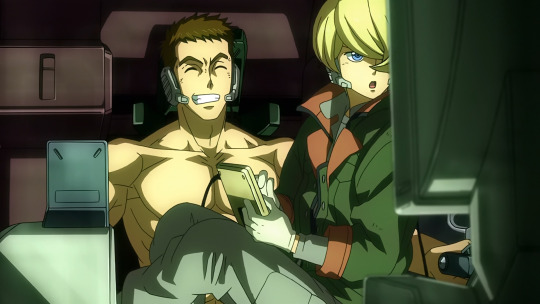
Yamagi Gilmerton is a small, quiet teenage boy with a somewhat withdrawn and acerbic personality, who spends much of Iron-Blooded Orphans nursing a hopeless crush on mobile suit pilot Norba Shino. Like the majority of the cast, Yamagi is a child soldier, but a mechanic rather than a combatant. Additional backstory commentary reveals that he struggled on joining CGS mercenary group due to his physique. Indeed, while this detail is not directly referenced in the anime itself, he is indeed drawn noticeably thinner than the other boys.
Again, we veer towards stereotypes, where a queer character is portrayed as weaker and more effeminate. Yet in spite of leaning this way in looks, Yamagi is an eminently capable person, never treated as lesser for fulfilling a support role rather than being a fighter. If anything, IBO goes out of its way to highlight how vital good mechanics are to mechanised warfare, and we see multiple examples of Yamagi being both assertive and kind of badass. At one point, he scales, unaided, an 18 metre tall mobile suit that's collapsed to its knees. When he and Shino are revisited in spin-off game Urdr Hunt (soon to be some form of animated production), he pilots a spaceship within an active battle-zone, flying escort for a damaged freighter as it retreats. In Season 2, he's comfortable ordering Tekkadan's new recruits around and is the first person to properly chew Orga out for his failings as a leader. Far from being an outlier among the protagonists, Yamagi is equally brave and dedicated to the cause, irrespective of his sexuality.
To be fair, he does tend to clam up and grow more awkward around the object of his affections. To be equally fair, he has the misfortune of having fallen for the most oblivious himbo on God's red Mars.
Shino is a big, boisterous warrior, the polar opposite of Yamagi in personality and physicality. He embodies Tekkadan's machismo, eagerly anticipating the chance to prove their strength and generally being a standard bearer for becoming the biggest, baddest group around. Things are not as straightforward as they seem on the surface, however. He shows a good awareness of when the group is in over their heads – going so far as to suggest retreat in the face of bad odds several times – and he is not nearly as sure of himself as he might first appear. He displays a wide streak of insecurity about his abilities as a soldier, reacting badly to people questioning his dedication or competency. And he crumbles completely when some of his comrades are killed as the result of a split-second mistake on his part, stating a wish to have died in their place. Thereafter, he acts in ways that read as choosing to take all the risks on himself rather than go through more loss. It makes him an interesting mix, someone who acts as a cheerleader, boosting everyone else's morale, while swallowing his own doubts and personal fatalism.
He is also presented as one of the most sexually active members of Tekkadan, using his wages to visit brothels to sleep with women. Indeed, he is frequently found extolling the virtues of the opposite sex, referencing collections of pornography (at least in the English dub), and generally being a very typical teenage boy about such matters.
Given this, you might assume Yamagi is longing hopelessly for a straight man. That is indeed the idea the show teases us with for much of its run (can something be straight-baiting? I feel if anything ever earned that title, it's this). OK, Shino's fond of Yamagi as a friend and frequently relies on his assistance in improving his fighting ability, and per ancillary material, is the one who got Yamagi transferred to the mechanics corps in the first place, rescuing him from struggling in the infantry. And sure, Shino spends an awful lot of time in very close proximity to Yamagi, including literally pulling him into the cockpit to assist with a mission. And yes, Shino is absolutely a flamboyant creature, sporting gold ear studs and an attraction to the colour pink, ensuring his mobile suits are painted all over magenta in order to stand out on the battlefield. And certainly, Shino is extremely empathetic, adjusting his attitude depending on his impressions of other people, such that he dials his boisterousness down in Yamagi's presence, displaying a far more gentle affection than he does with his other friends.
But clearly he hasn't noticed Yamagi is head over heels for him.
Right?
Well, towards the end of Season 2, during another moment where Yamagi is literally sitting on Shino's knee, Shino proposes the two of them drink together all night long once the fighting is over. Not only is this an unambiguously romantic overture (he's asking while pushing aside the fringe that normally covers half of Yamagi's face, in order to look into his eyes properly), it comes after a joke several episodes earlier in which Shino has to explain to a less worldly comrade that a girl inviting you for a drink is not a request to go out with the whole gang but a far more intimate gesture (I say explain, it's more expressing incredulity Akihiro didn't realise Lafter was asking him on a date). Later, it is revealed Shino did indeed work out that Yamagi 'likes' him (to his friend Eugene's exasperation that it took him so long to notice), and he reacted with amazed delight to discover there was someone in Tekkadan who'd fall in love with 'a guy like me'.

He'd assumed because Tekkadan is a family (a description provided by their ally Naze, which everyone just kind of runs with), romantic love wasn't possible between them. Having worked through this mental block and finally realised the blindingly obvious, he renews his desire to protect Tekkadan as long as he lives, refuting his previous view of himself as an expendable human shield and heading out with every intention of surviving all the way to the end.
And because IBO is an exquisitely-written tragedy, he is promptly killed while attempting a futile one-man attack against their enemies, his advances on Yamagi forming part of a long build-up whereby the boy who loves him provides the tools he needs to charge into a suicide run.
Right then. *drags out the reading comprehension soap-box* I have seen some people refer to this as an example of the 'bury your gays' trope, and there is nothing more likely to get me manifesting behind you in the form of an irate shoebill than to do likewise. 'Bury your gays' refers to a tendency for queer characters in fiction to disproportionately suffer tragic fates. This is a writing choice usually rooted in the idea queer relationships are inherently tragic, either because they are viewed as a perversion of 'correct' forms of love, or because of some misguided idea the prevalence of homophobia means queer joy is impossible. I am going to be charitable and concede this is indeed a case where one half of a budding homosexual relationship dies horribly. But, as always, the context matters.
All but one of the romantic relationships established prior to the epilogue of Iron-Blooded Orphans end in death. Of the two that survive in some capacity, one is a heterosexual background romance between two older characters and the other is a pair of women I shall be covering later. IBO is a story about child soldiers that does not shy away from the fact these are teenagers being fed into a meat-grinder. That the director's original intention of killing every named character was toned down (to the series immeasurable benefit, in my opinion) dos not change a narrative arc towards doom.
Within this, Yamagi and Shino aren't singled out for being queer. The coyness around Shino's eventually-evident bisexuality serves to generate an instant of hope and relief right before the rug is pulled from under everyone's feet. Where Shino's death does differ from those of other characters is in presentation: he dies alone and does not get any form of farewell or the passing-on moment afforded to others. But that is only to be expected, since we're talking about the point where it becomes clear there is no saving the situation. It's a cruel, abrupt moment of bad luck, puncturing the heroic idea of scraping victory at the last second. Shino flew out intending to live and he died anyway. A queer relationship forming part of what he was fighting for is an almost incidental detail.
(As an aside, I am aware of two other examples in Gundam fiction where a pilot and a mechanic have a doomed love affair. One is in Char's Counterattack, where a male engineer's romance with a female pilot ends with them both being abruptly killed, and the other is from Gundam AGE, where a female mechanic sacrifices herself for the greater good, leaving a male pilot to mourn her loss for the rest of the series. Shino and Yamagi reiterate this same concept.)
Stepping back from the tragedy, Yamagi's love for Shino is as delightfully underplayed as the other relationships in the show, with little emotional melodrama being wrung from the romance itself. Yamagi can't bring himself to declare his feelings, frequently turning cold instead and perpetuating Shino's misunderstanding of where they stand. Yet Shino ultimately proves enthusiastic for the idea, rendering moot any concerns Yamagi had over getting turned down (going beyond the text, a Q&A with the series' director confirmed Shino was written as bi). Equally, in the aftermath of Shino's death, Eugene comforts Yamagi by relating the truth of Shino's earlier realisation and even going so far as to rebuff Yamagi for implying there's something wrong with him for grieving. This and other interactions in the same episode imply those nearest to the pair were well aware of Yamagi's desires and had absolutely no problem with them. The prevailing attitude within Tekkadan is one of complete acceptance for its members and this is no different.
Indeed, for me, the most important part of how queerness is represented in IBO is that it is treated as just another aspect of the diversity of the cast. I've seen it stated that viewing homosexuality as a natural part of human existence was Tomino's motivation in making Guin gay. IBO presents us with the same idea, far more seamlessly and far more positively.
Now, let's leave the anime proper and look at the same-sex pairing from spin-off manga Iron-Blooded Orphans: Moon Steel.

Deira Nadira and Mina Zalmfort are part of the Gjallarhorn nobility and their marriage was arranged to strengthen relations between their two families. We see an example of a similar political match in the main show, where the heir to the Fareed family, McGillis, is betrothed to the second child of the Bauduins, the much, much younger Almiria. That this can take place regardless of the gender of the participants has big implications for the functioning of a bloodline-focused aristocracy. Presumably it indicates they are happy to use medical technology to ensure the Nadira family continues into the next generation, and if same-sex marriages are thus permitted, that means fewer factors to worry about when it comes to perpetuation. Whether male-male weddings are allowed too remains an open question; given the existence of real-world double-standards, it is possible Deira and Mina represent the only acceptable form of homosexuality. Nevertheless, that it is accepted speaks volumes. Gjallarhorn is not an especially progressive organisation, built as it is on rigid class structures and notions of human purity. Yet here we are.
Perhaps we should have expected that the norms around gender in this system don't correspond to strictly patriarchal patterns from the real world. Carta Issue, a key player in Season 1 of the anime, is the only child of the Issue Family's current leader and positioned as his sole heir, irrespective of the fact she's a woman. The logical inference is that any children of hers would count as Issues, rather than belonging to a potential husband's family. Deira is similarly the heir to her father's position, although intriguingly, it's not outright confirmed if she is his only child or simply the oldest. The possibility exists that gender is a non-factor in determining inheritance.
With respect to sexuality, Deira seems pretty obviously intended to be a lesbian. Her relationship with Mina is presented as one they are both happy with, despite it being an arranged by their parents, and Deira is depicted in the manual for Gundam Gremory's model kit as favouring the clothes of 'a handsome man'. She doesn't present that way within the manga' story, first showing up wearing the standard unisex Gjallarhorn pilot-suit, then wearing a formal gown for a meeting while in an official capacity. But she is depicted wearing masculine clothes in silhouette when initially mentioned and in a post-story panel at the back of the final volume.
(Another aside: the fan translations I use for this part of the manga refer to Deira using male pronouns when she's introduced. However, that could simply be down to the poor quality of said translation; she's consistently referred to using female pronouns in official materials and the game adaptation of this scene has her named as simply 'Lord Nadira', the standard appellation for Gjallarhorn family heads.)
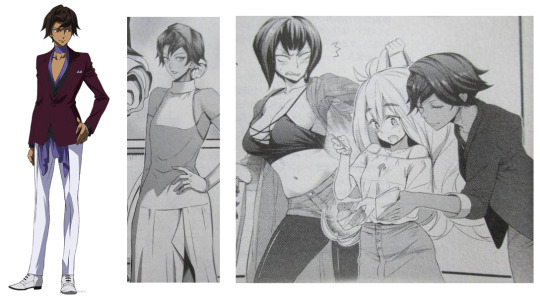
Whether Deira's code-switching is the result of institutional expectations around her role or personal preference, it adds extra texture to her depiction. While civilian garb was designed for the adult version of Carta and closely matches conservative gender expectations for a woman, she's never shown wearing it, so we don't have a point of comparison to judge what's required of a character in Deira's position.
Regarding Mina, you'll notice I grouped her with Shino rather than the characters whose sexuality I consider to be stated outright. With Shino, the nature of his sexuality is not put absolutely beyond question in the text. This is splitting hairs due to the overt nature of what's on screen but the fact remains, the anime doesn't clarify if his being open to Yamagi's love means he already thinks of himself as bisexual, or if this is something he hadn't considered before. With Mina, it's more a case that I'm unwilling to label her one way or the other based on the available information. Deira carries sufficient signifiers, I find little room for doubt over the intention. We also have an outright statement that she holds great affection for Mina regardless of being obliged to consider her an eventual romantic partner. Indeed, she becomes so upset by believing her fiance dead, she runs off to Antarctica in a Gundam. But the exact depth of Mina's feelings in return is not discussed.
In addition, Mina is considerably younger than Deira. McGillis and Almiria's match takes place when he is (probably) somewhere in his late twenties and she is nine, with plans for the union made four years prior. This is not great, to put it mildly, albeit fairly typical of how such things have historically worked for nobility. Based on appearances and how they are treated by the rest of the cast, I would assume Mina to be in her mid-teens, and Deira to be in her early twenties (annoyingly, exact ages are provided for several characters in Moon Steel, just not these two). A less dramatic gap (and I don't believe Mina is meant to be quite as young as her appearance perhaps suggests), yet still significant when one of the people involved is below what we'd consider adulthood.
There is no indication of anything untoward going on, within the confines of the situation, similar to how we're given no indication McGillis is abusive towards Almiria. Any comparisons with Lord Iznario's activities lie purely along the axis of how children are exploited by adults even without suffering directly. All indications are that Deira and Mina have made the most of something they have little choice in. Regardless, I still feel more comfortable describing Mina as open to being in a relationship with another woman, rather than pinning her to a specific preference.
Continuing the theme of things where doubt or ambiguity exist, let's discuss some characters were there shouldn't be any: Atra and Kudelia.
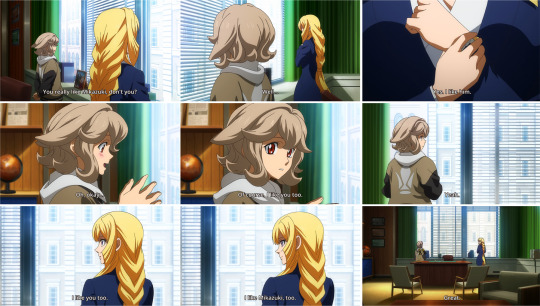
I don't know about you, but I find it extraordinarily hard to read this as anything other than a three-way love-confession. Still, in the interests of fair play, let's review the wriggle room for declaring this something else.
Kudelia Aina Bernstein and Atra Mixta are love interests of nominal protagonist Mikazuki Augus, in an iteration of another tried-and-true trope, that of a male lead inexplicably being attractive to the female characters in his orbit. Or rather, it would be if the show didn't take such pains to demonstrate why these girls fall for him, setting up a long-established crush on Atra's part (rooted in him being the first person in the world to be nice to her) and a mutual respect on Kudelia's that gets spurred to more when Mikazuki randomly decides to kiss her because she 'looked cute' (Mikazuki has the manners of a feral stray raised on the streets, because that's precisely what he is).
Justification aside, this has the makings of a traditional triangle, that is, one without a connecting base, which we might expect to be resolved by either Kudelia or Atra 'losing out'. For a few episodes, this does indeed seem where we are headed. Then Atra discovers the concept of polyamory via the polygamous Turbines group and all bets are off.

Having realised it is perfectly possible for a family to consist of multiple romantic partners, Atra proceeds to work towards ensuring everyone gets everything they want. Strictly speaking, this doesn't mean she is attracted to Kudelia as well – even if she clearly recognises Kudelia as an attractive person from the start and…
You know what? Acknowledging that the information about their eventual marital status was only stated in interviews at live events with no official record and seems to have been framed around raising the son Atra has with Mika, I'm going to abandon the pretence of both-sided objectivity and go straight for the throat. Turns out my patience for soft-footing this lasts about as long as it takes to say 'bi-erasure'.
Over the course of Season 1, Atra not only decides the end-game is some form of three-person wedding, she also:
Shows no jealousy over Mikazuki and instead chides him for not providing the correct emotional support to the girl he kissed.
Spends a great deal of time with Kudelia and enthusiastically throws herself into furthering Kudelia's goals, without necessarily understanding the technicalities.
Covers for Kudelia by pretending to be her during a confrontation with Gjallarhorn soldiers, getting herself soundly beaten up in order to prevent them from chasing after the real deal.
Drives an armoured car through a battlefield for Kudelia's sake, safely delivering her to a vital rendezvous.
Leaps in front of a massive mobile suit to push Kudelia out of its path, physically shielding the other girl with her body.
As much as it pains me to resort to the 'if this were a man and a woman, would it read as romantic' crudity – yes! Yes it would! Especially since in Season 2, Atra presents Kudelia with a good-luck charm bracelet she has woven, something she previously did for Mikazuki explicitly out of having a crush on him. I'm all for embracing platonic love (which is why Takaki and Aston are not featuring in this rundown) and there's nothing in the above list necessarily entailing attraction beyond deep friendship. But when Atra consciously repeats her actions towards Mikazuki (someone she goes on to definitely have sex with) with Kudelia and it leads to the scene between them where they declare how they feel about each other and Mikauki, looking for non-romantic angles takes more effort.
After all, if we are to read Shino's openness to Yamagi's affection from the things he says and how he looks saying them, we can certainly do the same for Atra and Kudelia's use of the word 'like' in reference to one another and their reactions to hearing it said of them. (Obligatory note that if there is some nuance in the original Japanese the translation doesn't capture, I'd love to hear about it. The English scripts, however, leave little to the imagination.)
It is indisputable that Atra feels a strong affection towards Kudelia and while I have been focusing on her a lot (she is by far the most proactive member of the triad), Kudelia reciprocates at every opportunity she is presented with. Even if there truly wasn't an intention to portray this as exactly equivalent to Atra and Mikazuki, the end result manages to be on par with Yamagi and Shino. Consider Kudelia and Mikazuki, for example. In terms of portrayal and the two-girls-one-guy trope being explored here, they have the same level of chemistry and the same absence of overt consummation as Kudelia and Atra, and it would hardly be a serious position to claim the show does not place the two of them in romantic conjunction, now would it?
You may at this point be wondering why I am getting so defensive of reading Kudelia and Atra as romantic partners. Honestly, I am too. On reflection, I think it's because IBO is playing around with such a worn-out and insipid means of wringing drama from characters who should know better, I keep searching for the catch. And yet there isn't one. This show really did respond to a nascent love chevron by having the mousy, homely girl tell the governor's beautiful daughter to shut up and get in the polycule, and turned it into a true triangle.
That's wonderful. I cannot properly express the wave of joy and relief that came over me when I realised this was the direction they were taking. It ends in tragedy, of course, Mikazuki giving up any chance of a peaceful life to die in battle, far away from the women who love him. But their lives continue because of his sacrifice and by all appearances they remain together. In some ways, for the overarching message of hope persisting on the back of heartbreak, the precise details of that arrangement don't particularly matter. So why not take the gayest reading possible?
What an excellent segue into a blink-and-you'll-miss-it, probably-stretching-too-far, nonetheless-compelling potential bit of queerness: Chad in the series epilogue.

One of the many tertiary characters in Tekkadan, Chad Chaden has minor speaking parts throughout Season 1 and a larger role in Season 2. He initially appears during a particularly dire early moment when it looks like everyone is about to be killed by attacking mobile suits. His obvious resignation to this fate sets the tone for a rather dour personality, at least while on the clock. Chad starts out as human debris, a person enslaved after a space battle and sold to the CGS military group as free labour. This gives him a very matter-of-fact attitude towards fighting and the kill-or-be-killed nature of being forced into it – he voices the sentiment that even when facing other human debris, they can't afford to show mercy.
Off the clock, Chad displays a more sensitive personality. He seems studious, learning about interplanetary communications from Kudelia's maid Fumitan and later being promoted to leader of Tekkadan's Earth branch. He has some difficulty acclimatising to being treated as a free person, proving unsure about the concept of wearing a smart suit instead of his normal fatigues. And he grows anxious when he returns to Mars to discover nobody told him two of the few adults in the group (Yukinojo and Merribit) had started dating, worrying that he's no longer 'one of the guys'.
The most we learn about his relationship preferences prior to the series epilogue comes in a comedic sequence about a third of the way into Season 2, when Shino suggests a trip to a local brothel. Eugene responds by proclaiming that he's realised money will not buy him true love. This prompts Chad to ask Merribit if this is true and, on her saying she supposes so, opts out of the trip as well. Judging by his body-language in the next frame where he appears, this is possibly a decision he regrets – perhaps owing to his anxieties, since he just passed up the chance for some team-bonding.
None of this is directly relevant to the topic of this essay. If anything, the scene I just described suggests that, like Eugene, Chad has previously gone along with Shino in paying for sex with women, only to discover he wanted more than just physical intimacy. But then we get the exchange in Kudelia's office during the last episode, following a time-skip after Tekkadan's defeat and dissolution. Now working for Kudelia as an assistant of some kind, Chad notes that Merribit is shortly to give birth to her and Yukinojo's second child, saying he and Yamagi intend to meet up later to plan a celebration. Eugene reacts with amused disbelief, accusing them of just wanting an excuse to go out drinking, to which Chad retorts, 'what's wrong with that?'
And the thing is he's blushing when he does. Which may simply be because Eugene is accusing him of slacking off – IBO characters blush all the time and their embarrassment is frequently to do with being caught acting immature or otherwise against how they want people to see them. But given the weight that 'drinking the night away' carries in regards to Yamagi following Shino's actions shortly prior to his death, it is easy to speculate this represents something more specific.
As far as I can recall, Chad and Yamagi do not interact at all over the course of the show's two seasons, meaning these lines present a rather unexpected combination of characters. Eugene would have seemed a more likely candidate to associate with Yamagi. He's positioned as Shino's closest friend, he comforts Yamagi over his grief, and they are together for much of the climax to the series' plot. So what has happened in the years since, that Eugene's teasing should elicit a blush from Chad instead?
If we put on our shipping goggles, it's far from a nonsensical pairing. Chad goes through an arc not too dissimilar to Shino's. He is knocked into a coma while protecting an ally from a bomb blast and subsequently the Earth branch gets swept into a war orchestrated by one of the factions within Gjallarhorn. On recovering, he blames himself for the many deaths that result, echoing Shino's line about thinking it better if he'd died in place of his comrades. On returning to Mars, he jumps head-first into mobile suit training, determined to make up for his perceived failure as a leader and cheering himself up through rigorous activity. Different though their personalities appear on the surface, there are clear commonalities here. Further, Chad's responses to his traumatic experiences have a more measured quality to them than Shino's. He is not nearly as reckless and provides clear directions to his comrades even while acting as a decoy against a dangerous enemy, rather than abandon any attempt to be an effective leader. Taken together, and coupled to a more long-term view of romance, these qualities might make him a 'safer' version of things Yamagi loved about Shino, creating space for them to be drawn together.
Or perhaps they're simply the most logical points of contact between the ex-Tekkadan survivors at the Admoss Company and Kassapa Factory and intend to make that an excuse to get companionably plastered for no greater reason than it being a nice time. I am speculating over a couple of lines and an animation choice. Nevertheless, it does not feel like unreasonable speculation. When we already have a veritable gaggle of characters who are queer or may trivially be read as such, it's hardly a stretch to assume one more.
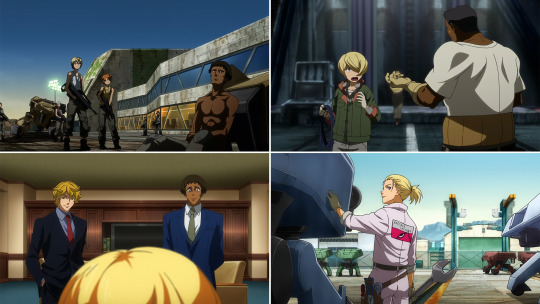
Chad/Yamagi doesn't appear to be a thread the fandom at large has pulled on much, likely because the pairing of Shino and Yamagi is so prominent, it eclipses a mere throwaway possibility. But I'm glad it exists within easy reach. And even if we take off our goggles, these lines demonstrate life for the characters has not stopped. The ex-slave and the gay kid are not stuck, trapped by the tragedies of their past. They have instead grown in both confidence and happiness and now have peaceful, stable lives where they're on going-out-drinking terms. That above all is why I wanted to explore this exchange: it reinforces Iron-Blooded Orphans' rejection of the idea the suffering people like Chad and Yamagi go through is perpetual or inevitable.
OK, one more character to look at. Let's talk about Orga and asexuality.
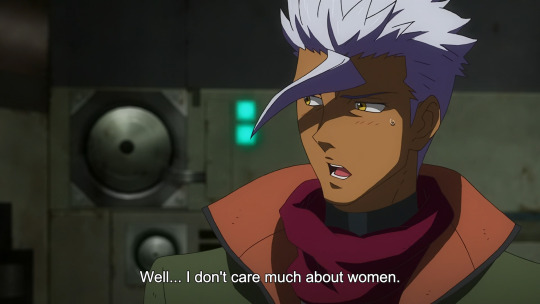
Orga Itsuka, leader of Tekkadan and instigator of the series' events, is notable for his charisma, his drive to provide a safe home for his comrades, and his complete unsuitability for the grown-up activities he attempts. Trying to party all night leaves him puking up his dinner. He forces himself into a suit and tie to handle the administration of a break-out paramilitary company, despite finding it stultifying and bewildering. His goals spin like a weather-cock, as he's surrounded by older characters possessing strong convictions while unable to stick to his own. And he is ultimately undone by an unwillingness to ask for help, having assumed that, as leader, he must decide everything alone.
I suspect his expressed lack of interest in women is intended to help convey overall immaturity. Orga is a good soldier and tactician, but he plainly isn't prepared for adulthood, lacking the grasp on the complexities of life that implies. Making him uncomfortable about sex serves to heighten the impression of a teenager trying to navigate circumstances for which he's not yet ready.
Relatedly, it should be stressed Orga stating he 'doesn't care' about woman is a response to Eugene asking if he agrees love and kindness are what's important, as opposed to Shino's endorsement of boobs. On hearing this response, Eugene proceeds to mock his commander for inexperience. That he himself has only just had his first sexual experience with another person and previously said much the same about not caring about sex simply proves hypocrisy is a fundamental aspect of Eugene's characterisation. The whole scene is very teenage.
Matters have not improved much when Orga and Eugene's dynamic is revisited in one of the side-stories released via the Iron-Blooded Orphans G mobile game. A year and change later, Eugene continues to act superior about having 'experience' where Orga doesn't.
Orga takes this rather poorly.

(Subtitles by @trafalgarlog)
Eventually Merribit has to shout at them to stop being brats, shaming them for behaving like argumentative children. It's funny – and then you remember they basically still are children and this is headed towards more carnage that will not spare them for being young. Such it is to engage with Iron-Blooded Orphans.
What does any of this tell us about Orga's sexuality? In principle, taking it as a device to convey immaturity, nothing. Orga's persisting virginity could simply mean he's not worked out this aspect of himself yet. He is a busy young man who likely hasn't had the time to try.
Alternatively it could mean he is gay. Mikazuki/Orga is an extremely popular ship in the fandom and we might take Orga's professed lack of interest in women as 'evidence' of him swinging the other way.
Or we could take my view, that Orga is asexual and his embarrassment is rooted in just not getting what the big deal is.
To immediately clarify, I don't think he is ace because he 'hasn't worked out what he wants', I think he's ace because he blushes on admitting he doesn't care about women and does not try to prove otherwise once he's in a position where he could easily do so. In circling back to the same joke for the side-story, the writers portray Orga as continuing to be uninterested in sex and sensitive over being needled about it. Again, a feasible interpretation is that he's into guys. Yet this is an argument with Eugene, whose response to the idea of Yamagi being in love with Shino is basically 'you mean you didn't notice?' Eugene is a dork and jerk; he isn't bigoted. None of the Tekkadan guys are. It's unclear if homophobia is even a factor in the setting. Sexism is, but when someone as superficially macho as Shino is comfortable with male/male attraction, and there are same-sex weddings inside Gjallarhorn, we cannot assume stigma exists around being gay. So why should Orga be worried, unless it goes beyond a question of who you're attracted to and into the answer being 'nobody at all'?
When you're surrounded by people who happily wax lyrical about how the joys of sex make you a real man, the absence of a libido might easily become a sore point.
Again, I'm supposing. Again, there is room to do so. As I touched on with Chad, it is easy to read queerness into the text when the assumption of straightness has been taken away, which is something this show does wholeheartedly and deliberately.
Orga Itsuka is one of the first characters I looked at and realised, not only shouldn't I assume heterosexuality, I shouldn't assume sexual attraction at all. I cannot credit Iron-Blooded Orphans alone with this. I do credit it with being a piece of media that applies itself to inclusiveness in ways quite remarkable for a show about giant robot fights, produced to market toys.
The word we want here is 'normalisation'. IBO has a lot to say about what constitutes 'normal' and a lot of it accords well with my own views, particularly those that have me twitching whenever anybody demands we 'be normal' about something. Normality is horrible. It is cruel and it is callous. 'Normal' is a world run on exploitation, on slave labour and on police savagery. Normal is children forced to risk their lives to earn the money required to feed themselves, because it is normal for their parents be gone, or incapable of supporting them. War is normal. Corruption of political systems is normal. Death coming more rapidly for those deemed expendable by society is very, very normal.
But so is protest. The drive to do something, to change things. The capacity for caring about each other. Love. 'Normal' is just a statement about what surrounds us every day, for worse and for better. In too many pieces of fiction, normality is narrowed, rendered a neater, cleaner picture, often excluding the kinds of people we might run into on the street, or walk past, or see on the news, distant and dehumanised.
Queerness is normal, yet for a long time it has been one of the first things to be cut out of fictional worlds. And when it is present, it's a big deal. An object lesson or a cry of triumph over breaking free of unfair strictures. I love stories about queer joy and victory. Heck, I'm a sucker for a good, soppy gay romance. But these aren't the only kinds of stories we tell. Sometimes we need to reflect the worst aspects of the world and what it does to normal people.
In attempting this, Iron-Blooded Orphans commits to an idea of 'normal people' that includes those who are gay or bisexual, those of colour and those we'd call white, the polyamorous, the illiterate, the desperate, the powerful, those who throw themselves into the fight with everything they have, and those who are simply kind. Those who are accepting, understanding and compassionate. Those who need to be accepted, who struggle to be understood, who suffer for a lack of compassion.
There are all sorts of people in IBO and – as a certain cheery, violent dumbass once said – man do I love it. I don't believe it is reading against the spirit of the thing to imagine more diversity than gets outright stated, to interpret one of the leads as ace or suppose another side character is bi or pansexual. It would seem entirely natural if they were.
Everyone's welcome here, down among the debris and the bloodshed, where hope is precious and fleeting and still somehow endures. So why shouldn't we raise a few extra pride flags?
Queer as in 'fuck you'
This all said, taken as a whole, Iron-Blooded Orphans is not a story about queerness or queer romance. Nowhere is this clearer than in its ending.
I skipped over the framing of the final scenes of the anime when I discussed Kudelia and Atra. They form a striking contrast with the ending of The Witch from Mercury, where the conclusion is directly focused around Suletta and Miorine's love for one another, their bonds of wedlock, and the happiness they have found together. This follows from the show being primarily about their relationship. In Iron-Blooded Orphans, the ending focuses not on Kudelia's feelings toward Atra, but those she has for Akatsuki, Mikazuki's son, with Eugene even saying she's eager to go see 'the man she loves', setting up a brief moment of uncertainty over who the character with Mikazuki's outline actually is.
The nature of Kudelia and Atra's relationship post-time-skip is implied rather than stated: in the English versions of the script, they do not refer to each other using terms suggesting they are married, although Atra has dropped her habitual 'Miss' from the front of Kudelia's name. They do not have wedding rings (redundant as those would be alongside the charm bracelets) and Akatsuki does not call Kudelia 'mom'. That they are raising him together is suggested very strongly, in line with Mikazuki asking Kudelia to be guardian of his child if he died. There are non-romantic ways of taking this idea, though, and none of these are closed off as viable interpretations.
But why should we expect some definite statement about romantic status when the point being conveyed is how Tekkadan's legacy continues to shape the world? This is a story concerned with the exploitation underpinning the world and the effort required to make even the smallest wide-scale change. It is about how people trapped at the bottom of the pecking order are still people, still human, messy and complex. It is about their pointless deaths, they ways they struggle on until those deaths come for them, and why they matter, even if the world forgets them.
Mikazuki, the living weapon, the human sacrifice for Orga Itsuka's reckless ambitions, leaves behind a child who will grow up in a more peaceful time, in a society slightly better off than when he and Orga were starving on Chyrse's streets. He doesn't live to see it; Akatsuki does. For all the failures, the attempt wasn't a waste. Don't you dare disrespect the people who died by saying it was.
This is where the epilogue centres, on Akatsuki and on Kudelia's cherishing of the world Mikazuki and everyone else built. Atra and Kudelia's relationship is there, a part of the gentler life they now have (Atra's desires were always towards the version of her existence where Mikazuki retires to a farm; here she fulfils the dream with Kudelia alone). It just doesn't need to take up space for the ending to land.
Yet, as I pour over how queerness is incorporated into Iron-Blooded Orphans, I find myself considering the struggles queer people face in reality. The victims of the AIDS crisis, dehumanised by indifferent institutions. Section 28 and the attempted destruction of knowledge around non-heterosexual forms of love. Riots and campaigns, voices raised loud and proud. How we are equated with dirt and corruption, reduced down to facts others find disgusting. The name-calling. The petty, pathetic posturing that makes everyday existence pointlessly harder.
So it goes for space-rats and degenerates alike.
I am lucky. My life is about as far from that of a child soldier as it is possible to get. My sexuality has been largely invisible. My gender matches the one most favoured by my society. I still have more common cause with those born in poverty on the other side of the world than I will ever have with the aristocrats and billionaires who shape the direction of my country. Because we hold many causes of misery in common. Because we share the same capacities for joy and suffering. Because our humanity is so easily cast aside by those we will never be able to touch.
There is always a place for stories uncomplicatedly about queer love conquering all. Equally, it is important to recognise the places queerness overlaps with stories about the many other ways the world casts people out. It is vital to be able to explore loss, futility and heartbreak. It is essential to capture why we strive onwards despite how heavily tragedy might weight us down.
We may be doomed. Our lives still matter. To ourselves, to each other and, whether they remember or not, to those who come after us.
So, no: for all the queer characters it contains and the many more we might trivially imagine queerness into, Iron-Blooded Orphans is not gay in the vein of The Witch From Mercury. It is not a happy story.
But it is a tenaciously hopeful one and, from certain angles, that alone looks queer as hell.
---------
Happy UK/US Pride Month – in honour and memory of Marsha P Johnson and everyone else who refused to go quietly.
I shall leave you with one of the least straight things ever to be included in any Gundam show.

[Index for further writing]
#gundam iron blooded orphans#gundam ibo#g tekketsu#tekketsu no orphans#gundam#turn a gundam#reference#notes#queerness#queer love#queer characters#analysis#spoilers#queer is a reclaimed slur and a term I apply to myself#heaven help you if you think this is the place to argue about that
69 notes
·
View notes
Text
UPDATE: The Destiel/Supernats aren't taking this well -- explaining my reasoning for the history I gave, and why Destiel is not the big bitch of shipping that it thinks it is
An update to THIS:
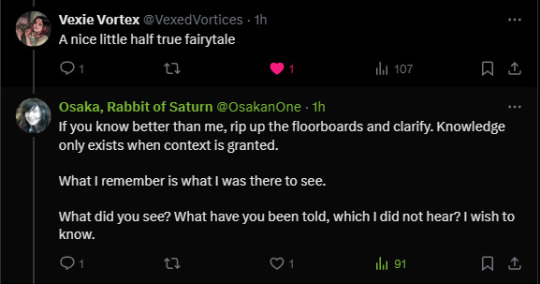
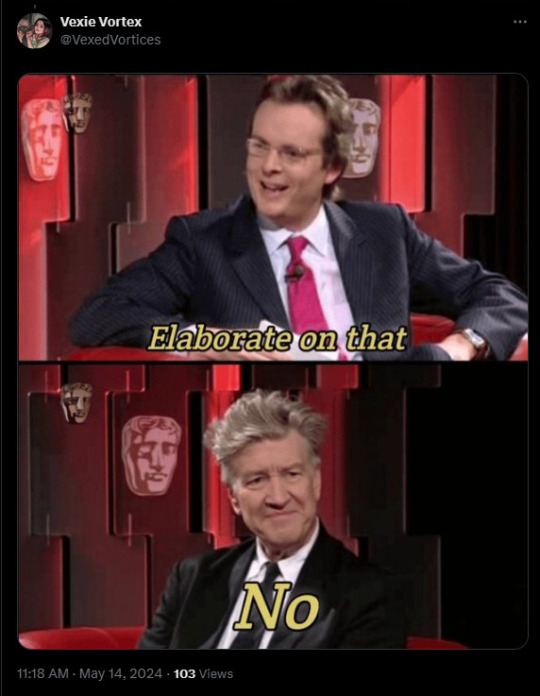
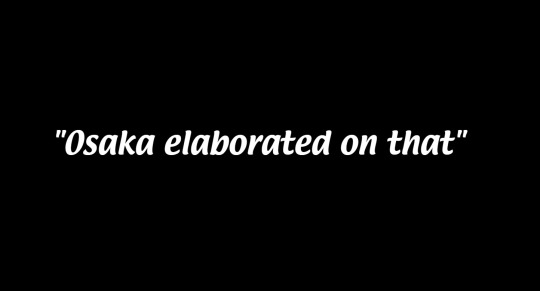
"This is just a marketing thing, Gundam is a giant robot show, only men watch it!"
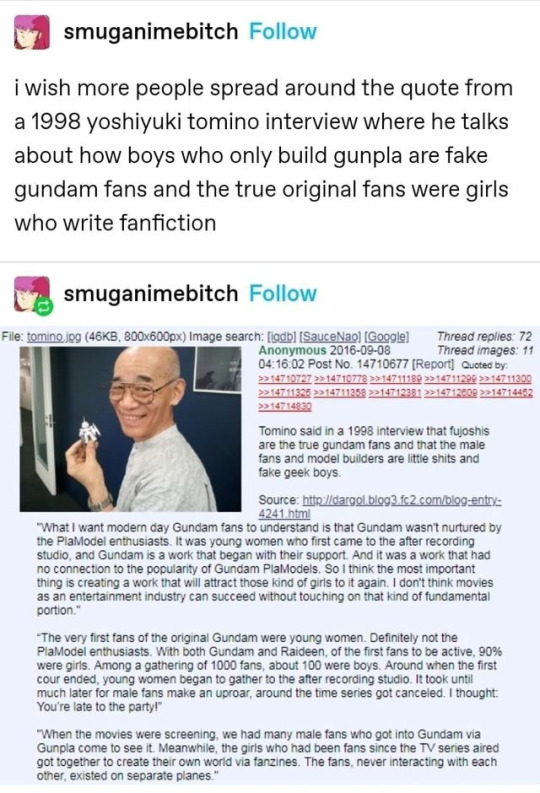
Gundam's fandom is silent majoratively feminine:
"But its not gay, its about giant robots!"
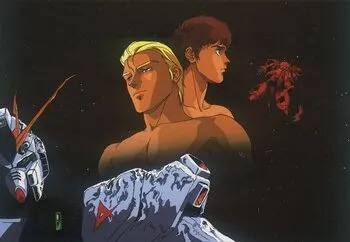
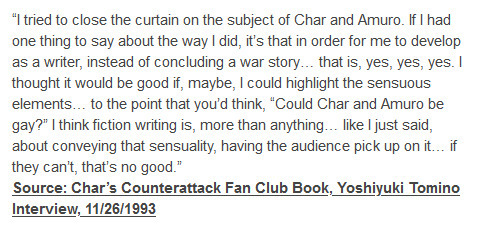
Gundam is very gay. The entire climax of the first story is a riff of Yukio Mishima lmao
The climax of the Amuro/Char arc of Universal Century Gundam (expounding from first Gundam circa 1979), Char's Counterattack is somewhat on the history of Japanese disillusion with liberalism which notably climaxed with the life and history of Yukio Mishima.
You know. THAT Yukio Mishima.
The one who wrote FORBIDDEN COLOURS.
It was so gay that the fanfiction inspired by it became its own damn anime:
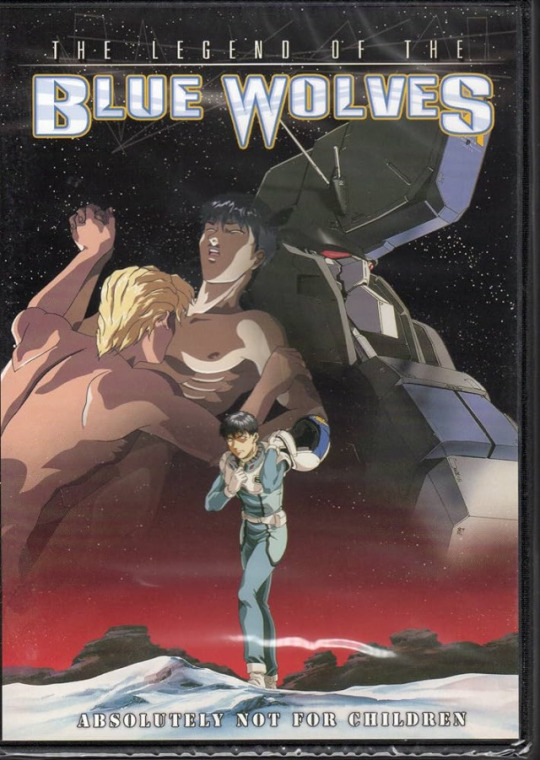
And that's just Charmuro, let alone Charma or a billion other ships just in OG Gundam alone.
We've got This is before we get to Guin Sard Lineford and Yamagi Glimerton (both verrrrry gay), Tieria Erde (a genderqueer trans-coded character who transcends gender entirely in their arc) and a bunch of others.
Gundam was always gay.
"I don't see the numbers"
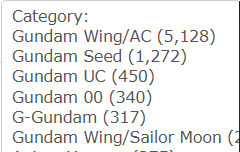
"That doesn't seem like much, Supernat is at least 2x this"
Sooooo the amount of content you do see isn't representative of how much even got written, given FFN had a huge content purge.
First, let's start with the relative proportion of users: If we're analysing the concept of fandom, we first have to look at who had access to the internet in the first place to publish works.
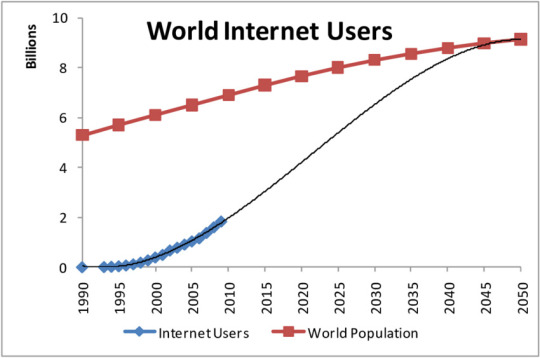
Yeah that's a pretty sizable difference.
Wing's fandom actually exploded in 2000, but got capped VERY early, distributing itself to fansites when FFN fragmented and collapsed.
Why?
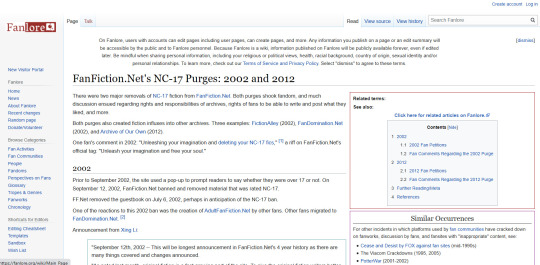
Content purges!
"Isn't there some sort of online archive of this stuff?"
Sure, if you wanna dig through tons and tons of Angelfire and Geocities pages which have mostly disappeared. Otherwise, no! There is no archive of this stuff?
"Why?"
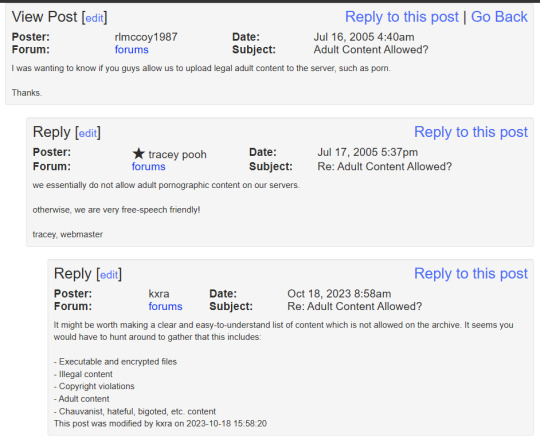
They've since rolled back on this but it means there's a massive amount of lost media out there, including the discussions on it and thus there's an entire history you didn't get to experience.
Its actually very difficult to reach people who've been involved, since it was so long ago that very few people remember, and a sizable proportion of that population have actually died.
"But what about SF fandoms? We have ancient records of stuff like Spirk!"
See unlike physical media like zines, when a server goes offline or there's a data-loss, or something like that there is no surviving copy of the thing in question.
The net result is we have this weird hole where content just vanished, and its now considered lost media. The work of many artists, designers, writers, even videos of events are just lost media because we didn't have the archival mentality adults develop.
You're not gonna hear about all the X-Files stuff or Frasier fanfictions or GW stuff because of these purges and the lack of physical media. FFN users were teens, not adults with resources like US/EU/JP SF fans, who had archival tendencies due to their long history.
So there is this supermassive black-hole in the history of fanfiction running between 1998, and 2008 and some of the only evidence of it are worksafe works and fansites which the owners have long since forgotten about because folks moved on. Moving on is a normal part of fandom.
So to those of you just saying "supernatural is losing to a pair of dumb anime girls" or "urgh this is just a trend tumblr will get over it and go back to supernatural"...
Uhhhhh no they won't, actually?
Supernat's fans mostly seem to be waspy Americans. Gundam is kind of a global phenomenon, one which has traditionally had a silent majority female audience, a vocal minority male audience -- and every time that majority has spoken up, its coincided with a content purge, or a TOS change that mysteriously biases American derived fiction over Japanese derived fiction.
Funny that.
tl;dr:
NATURE IS HEALING
96 notes
·
View notes
Text
Lord Guin Sard Lineford is perhaps the most illustrious chaser in the history of japanese animation
48 notes
·
View notes
Text
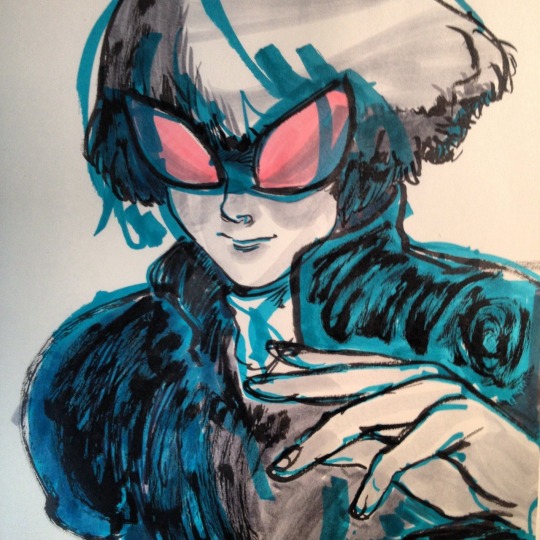
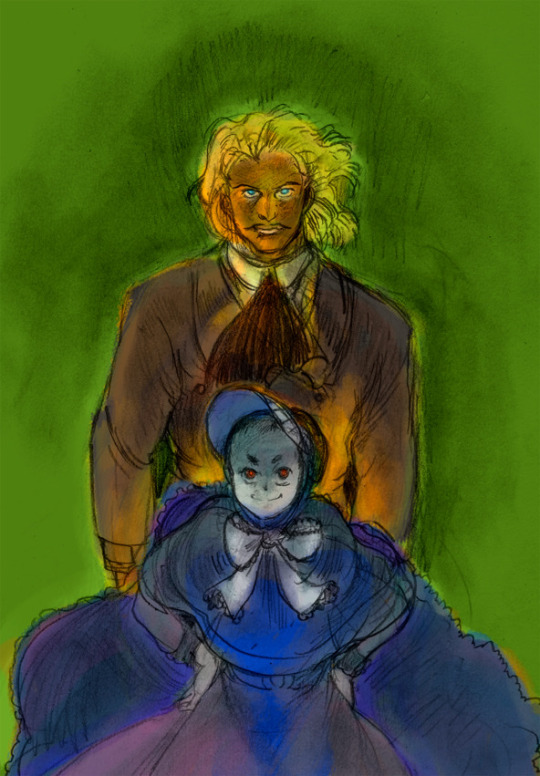

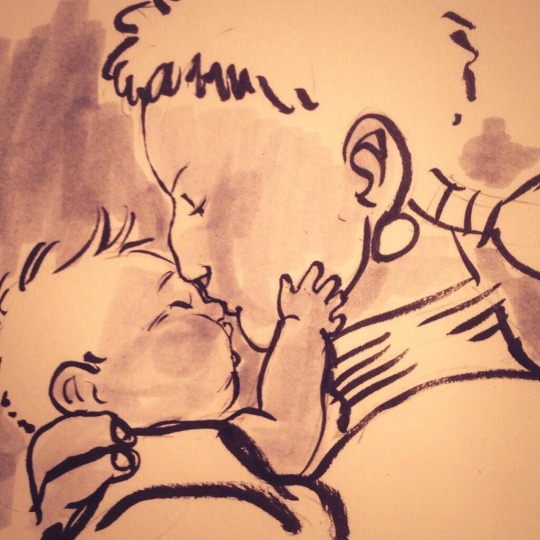
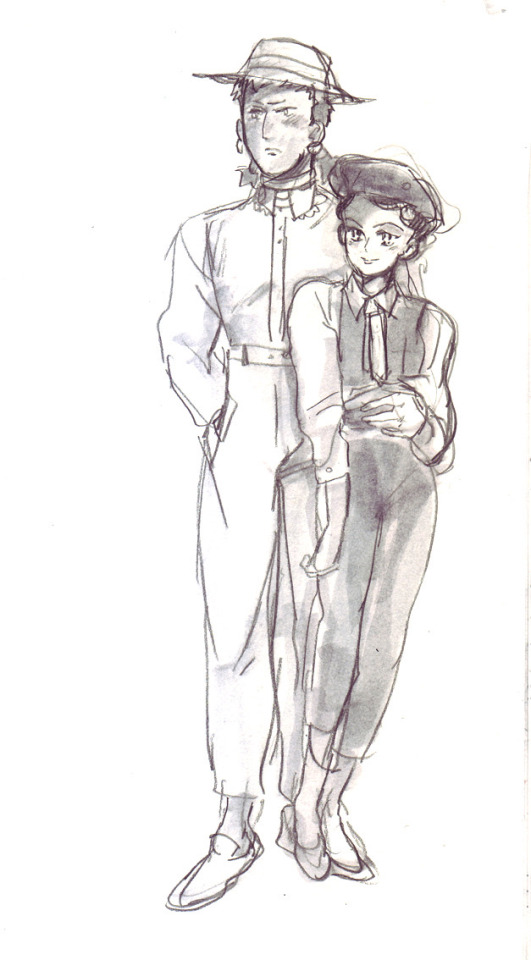

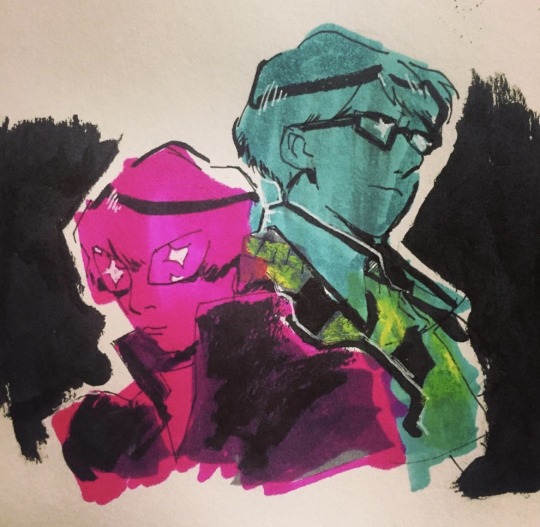
Various Turn A doodles of varying quality
#fanart#turn a gundam#Harry ord#guin sard lineford#Joseph yaht#cancer Kafka#merrybell gadget#Fran doll#muron muron
220 notes
·
View notes
Text

#gundam#meme#turn a gundam#turn a#guin sard lineford#lily borjarno#laura rolla#unfaithful boyfriend meme#i don't know if that's the actual name of that meme
7 notes
·
View notes
Photo

The canon LGBT+ character of today is:
Guin Sard Lineford from Turn A Gundam who is gay
67 notes
·
View notes
Text
Because it’s Pride Month and we’ve been having the BLM movement going strong, here’s a list of canon black LGBT+ characters
Disclaimer: I might be off on if a character is black, and this is not afull list. Feel free to correct me/add more, I don’t mind.
Disclaimer 2: I am not claiming any of these characters to be good LGBT+ or black rep, just canon.

Kaldur'ahm/Aqualad/Aquaman from Young Justice
Bisexual

Lucky from Let’s Meat Adam
Gay

Lizzie from The Perfection
WLW

Ford from Girlfriends’ Guide to Divorce
Gay

Lance and George from She-Ra and The Princesses of Power
Gay

Reo Niiboshi from Sarazanmai
Gay

Guin Sard Lineford from Turn A Gundam
Gay

Valkyrie from the MCU
Bisexual

Koth Vortena from Star Wars:The Old Republic
Bisexual or Pansexual

Janel Braddock from Agents of Mayhem
Lesbian

Faraday from Lies Within {Webcomic}
Trans Man and Gay

Georgie from Lies Within {Webcomic}
Lesbian

Maddie Bishop from Freeform’s Siren
Bisexual

Nathan Miller from The 100
MLM

Kevin Jones from Moonlight (2016)
Bisexual

Clementine from The Walking Dead Game
Bisexual

Chiron Harris from Moonlight (2016)
Gay

Vaya and Vamos from The True Lives of the Fabulous Killjoys
Genderfluid

Bethany Collins from Manifest
Lesbian
And I think that’s a long enough post for me, but again, feel free to add more!
11 notes
·
View notes
Text
Thank you for expressing that - it’s been mildly bugging me too.
Even just the Gundam franchise has featured overt same-sex attraction since at least Turn A Gundam (1999), with Guin Sard Lineford’s unsubtle crush on main character Loren. Now, that’s a complicated case since he goes out of his way to (unconsensually) feminise Loren as part of his attraction, but doing so actually jibes well with the rest of his character arc, informing the audience of how he sees the world as something to be shaped to his design while not necessarily questioning what’s informing said design. Plus, Loren himself is utterly unphased by having to cross-dress for unrelated plot reasons and the story didn’t, to me, seem to be framing the cross-dressing itself as the joke. The joke lies more in more the steps he has to go through to be able to handle the upper-class finery he’s got to wear and the inevitable fact he has to drive a Gundam in a ballgown.
I’m not saying G-Witch isn’t a step up from something like that, or even what IBO did. It absolutely is, if the protagonist herself is explicitly lesbian or bi, or however that ends up shaking out. But it’s not coming out of the blue. It’s the next step in a progression of franchise gradually incorporating more overt LGBTQ+ elements, and it’s worth bearing that in mind when discussing the show.
I don't feel particularly uneasy about my internet devices casually stalking me... I actually think it's kinda cool that quite a lot of the articles being recommended when I open my browser these days are all anime related. That said...
Damn if they don't almost always sound like they were written by a new anime fan... who really wants to analyze and have opinions about anime... but maybe hasn't seen enough to really know what they're talking about yet...
The one that popped up today was titled "Gundam is Gay... and not just subtextually anymore."
And you know what? The only Gundam I've seen so far is still Iron Blooded Orphans (though that new one that's airing right now looks really good), but even I could tell you there was nothing "subtextual" about it.
They were really clear about Yamagi's crush on Shino. Atra and Kudelia literally end the series married and raising a child together.
The mecha genre in general is actually a lot "gayer" than I think some people realize. Mecha series often include stories of young people growing up and discovering who they are, and sexuality tends to play into that. Hell, I'm still pissed that Netflix censored those parts out of Evangelion when they got their hands on it. (In 20-fucking-20!)
40 notes
·
View notes
Photo

32 notes
·
View notes
Photo



Hey folks. So since Stephanie's post went over pretty well compared to my expectations, it's time to talk about a character I've teased you with for about a year now. Ladies, Gentlemen, People who do not identify by those labels, I present Mr. Guin Lineford.
The series Turn A Gundam, aside from being where I got my name when I transitioned, was the 20th anniversary series for the famous Gundam franchise. The franchise started back in 1979, and was in many ways inspired by Star Wars, although its own popularity would mimic that of Star Trek, only gaining its true audience through syndicated reruns. Regardless, for many years, the man behind the series was Yoshiyuki Tomino, a man who is fairly respected in the industry, primarily in the science fiction and fantasy genres. However, when tapped to direct and write a story for the 20th anniversary of the franchise he was the driving force in creating, he decided to make a Victorian-era period piece with giant robots. Because if there's one thing to remember about Tomino, it's that he has a very broad span of interests in regards to world culture and history.
Turn A had many interesting changes from a typical Gundam series. The protagonist was a dark-skinned young man, the setting was a future-past version of the United States, the mechanical designs were notably by Syd Mead (of Blade Runner fame), Loran crossdressed in a gorgeous Victorian style dress that was almost perfectly designed for such a purpose (artistically speaking), and the reason for the crossdressing in the first place has long been rumored to be a subtle protest from Tomino for being unable to have a female protagonist for the series.
So, how is Guin important to all of this? First off, did you not read the captions of the pictures up there? Sorry, not the right time for snark. Anyway, Guin Lineford is basically the man in charge of the Amerian effort to negotiate with the Moonrace, and has been for some time. His primary efforts in the series are directed toward peaceful negotiations and the eventual desire to advance the coming industrial revolution by using Moonrace technology. He ends up traveling a bit down the wrong path, and makes some deals with various devils, but when it's all said and done, he did have both the people's interests, and his own, in mind the whole time. Perhaps one of the most unique aspects of Guin, however, is that he fell in love with a young man he called Laura. That man was the protagonist of the series. Honestly, it's kinda sad when you realize that he really never had a chance, seeing as how Loran only had eyes for Queen Diana, anyway. All well.
So, why is Guin so significant here? How about the fact that in the 20 years of the Gundam franchise, Guin Lineford was the first openly gay/bisexual character in the whole damn thing? There are a few other characters that have had subtle hints toward possibly being queer in some fashion (namely Emma Sheen and Iino Abbav), Guin was the first one out of the closet. Unfortunately, there have been very few other Gundam characters to be so open since then, and at least one of those is a horrible, HORRIBLE villain with some terrible stereotypes attached.
Oddly enough, the least surprising thing here is that Tomino was the one who introduced the idea of gay characters to Gundam. The two characters I named a little bit ago, Emma and Iino? Both are from Tomino series. Also, Camille Bidan, the protagonist of Zeta Gundam, has a feminine name that he's really angry about for most of the series. And for extra points in diversity, Gundam ZZ featured the heroes attacking a group of Zeon soldiers in response to them attacking a Muslim village during prayer, and Brain Powered has an African woman who follows the Yoruba faith. So yeah, I have some respect for the guy, even if he's made some really crappy shows on occasion. Amazing how some people just seem to love diversity.
#turn a gundam#gundam#yoshiyuki tomino#guin lineford#guin sard lineford#gay characters#bisexual characters#diversity
27 notes
·
View notes
Photo





Why did it take Lily until the end of the series to go from annoying to awesome? Rather than character development, it felt more like once Guin was bad they went and made Lily good to make up for it.
16 notes
·
View notes
Text

Gorgeous fanart of Loran and Guin from ∀ Gundam, by マロッテ on pixiv.
29 notes
·
View notes
Photo

Don't piss Guin off
6 notes
·
View notes